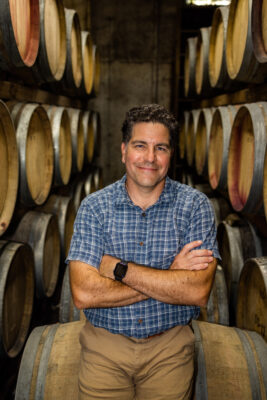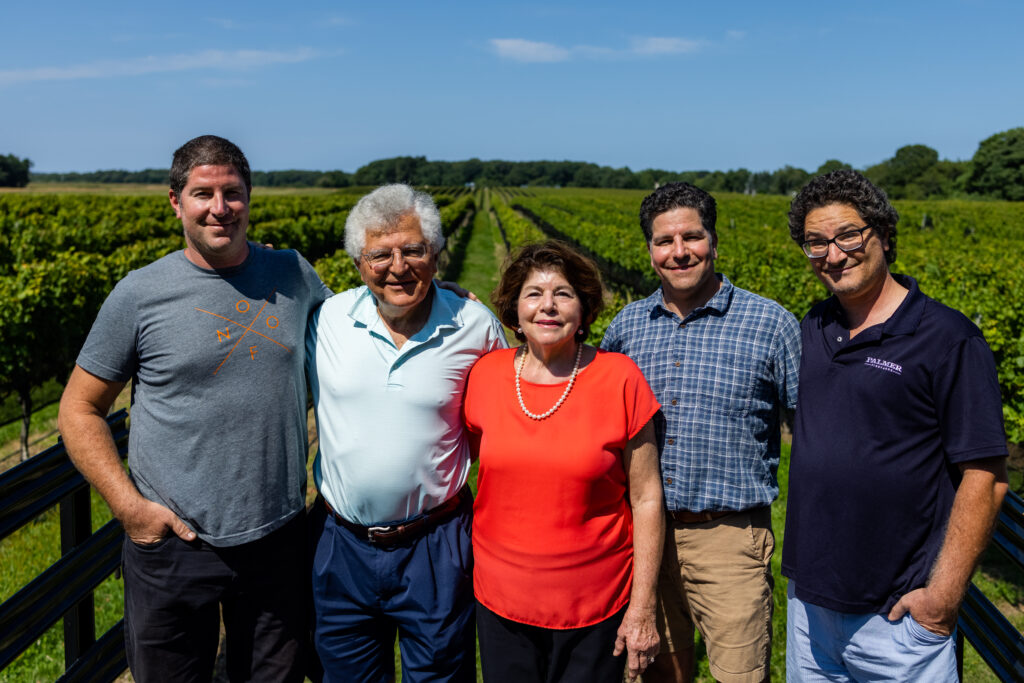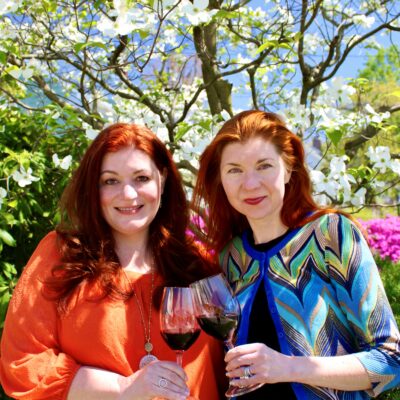
“I was speechless,” says Kareem Massoud, a second-generation winemaker at Paumanok Vineyards in Aquebogue, Long Island.
Kareem was referring to the recent honors he received at the New York Wine Classic 2023, which celebrates the diversity of wine in New York State. This year, 749 wines were entered from 108 wineries across the state. Scores were awarded by the Beverage Testing Institute’s sensory panel, made up of sommeliers, retail buyers, educators and beverage directors.
Of the 749 entries, judges awarded 10 Platinum, 320 Gold, 294 Silver and 81 Bronze medals.
Paumanok snagged Winery of the Year and the Governor’s Cup win, which, layered onto additional prizes for their 2019 Cabernet Franc; 2021 Chardonnay; 2022 Dry Rosé; 2014 Tuthill Lane Vineyard Cabernet Sauvignon; 2022 semi-dry Riesling, and 2019 Merlot, would indeed, render many speechless.
“This year we are celebrating so much here,” Kareem says of his family’s winery. “It’s the 50th anniversary of wine-growing in Long Island, the 40th anniversary of our founding, and now this. It is an incredible feather in our cap, and quite frankly quite humbling given the quality of the wineries out there.”
Kareem should know, as winemaker at Paumanok and his family’s offshoot brand, Palmer Vineyards and in his position as the president of Long Island Wine Country, home to 57 wineries. And while basic politesse demands that the recipient accepting an award declares their humility in the face of such an offer, in Kareem’s case, it feels authentic.
An Unlikely Path
His parents’ journey into winemaking was unlikely to say the least, but blessed by serendipity. Charles and Ursula Massoud met at an international student’s group in Philadelphia in the late 1960s.
“My father was from Lebanon, and was earning his MBA at Wharton when he met my mother who was an undergrad at Chestnut Hill College,” Kareem recalls. “My mother was born and raised in Germany, and their paths would never have crossed had it not been for that students’ group.”
Charles and Ursula fell in love and quickly got married. After graduating and starting a career at IBM, Charles was given the opportunity to launch IBM in the Middle East in 1970.
“I was born on Bahrain Island,” Kareem says. “But we lived in Kuwait, which was technically a dry country. So my dad felt he had no choice but to make wine and beer himself. The beer was terrible, but the wine was very good.”
Over time, both Charles and Ursula became increasingly fascinated by the world of wine, and during a visit to her family in Germany—and an auspicious meeting with family members who were winemakers—they “became inebriated with the idea of becoming vintners,” Kareem says. “The wine bug bit them. Hard.”
But real life intervened. IBM moved the growing family to Stamford, CT, where Charles and Ursula continued to view winemaking as a second chapter, still hovering in the distance, probably in Europe somewhere. Maybe Italy?
“And then my father read an article in the New York Times talking about Alex and Louisa Hargrave, and the incredible wine they were making in Long Island,” Kareem recalls. “My parents decided they had to meet them. They drove out, and hit it off and started to realize how much potential Long Island had for serious winemaking.”
By 1983, the pair and their three sons, Kareem (then 10), Salim (then 9) and Nabeel (then 2), were settled on a 42-acre estate, entirely owned and managed by Charles and Ursula.
“They only wanted to focus on vinifera planting, and they planted everything close together, at about 1100 vines per acre, to produce wines with concentration and power,” Kareem says.
Today, 12 varieties are under vine across 77 acres—including Sauvignon Blanc, Chardonnay, Riesling, Merlot, Cabernet Franc, Cabernet Sauvignon—are under vine. Now, the entire family is involved.
“My parents definitely were not excited by the idea of us growing up to be in the family business,” Kareem admits. “They told all of us to get a real education and go out in the real world. I did. Like my dad, I went to Wharton. I worked in private equity on Wall Street.”
Also like Dad, Kareem knew a good thing when he saw it.
“I love it here,” Kareem says. “They were really surprised when I told them I wanted to leave Wall Street and join them, but eventually, they came around to it.”
His brothers Salim and Nabeel followed an identical trajectory: prestigious education and career, U-turn to Paumanok. Salim manages logistics and administrative duties, while Nabeel manages the vineyard.
A Family Affair
Working with family members, Kareem says, has been an incredible experience.
“We are a great team,” he says. “There is built in trust and understanding. We can maybe take risks that we wouldn’t otherwise because of that trust.”

Over the years, their relentless hard work and commitment to what Kareem calls “Old World farming and production” values in this distinct New World maritime climate dominated by sandy-loam and gravelly subsoils has produced some of the most critically acclaimed wines in the region.
The wine that earned the Governor’s Cup in many ways encapsulates the phenomenal, uniquely American trajectory of Paumanok—which, by the way is the Native American name for Long Island, and translates to land of tribute. Walt Whitman made it famous in “Leaves of Grass,” with the poem “Starting from Paumanok.” It was Ursula, who studied poetry as an undergrad, who came up with the idea as a tribute to their family’s adopted country and their iteration of the American Dream.
The winning wine, a 2019 late harvest Sauvignon Blanc hailed, Kareem says, from “an amazing vintage.”
“September was one long sunny day with barely any rain,” he notes. “It was a great lay up for Sauvignon Blanc, which tends to ripen early. We let it hang, and some of the grapes got botrytis. We also froze the grapes and used a cryo technique to concentrate the must. Then we fermented it in brand new French oak barrels; the character of the wine is so strong, you can barely taste the oak.”
The history of this particular label, Kareem explains, is especially fascinating.
“Two prior vintages were served at the White House,” he says. “In 1999 our 1997 vintage was served at the 50th anniversary of the signing of NATO. Seventeen heads of state were there. And then in 2012, the 2009 was served for a Governor’s dinner with Obama. He sipped it with BB King and Mick Jagger before all three got up and sang. The 1997 was my father’s baby, and the 2009 was mine. This win just brings this wine full circle for us.”
With much to celebrate in the rearview, the Massouds are looking forward. The 100% solar-powered, certified sustainable winery can’t wait for what’s next, or the parties ahead.“We have several celebrations I’m excited for,” Kareem says. “First up is the Long Island Wine Country’s 50th, and then our 40th. After that, it’s harvest time, and time for our Festival. We’ll see what this vintage brings. So far, it looks like it will be a good one.”

Paumanok Vineyards 2019 Late Harvest
- Alcohol: 11%
- Residual Sugar: 16%
- Brix at Harvest: 30.9
Winemaker Notes: The Sauvignon Blanc grapes from our original planting (planted in 1984) behind the winery were allowed to hang on the vine beyond their normal point of full ripeness to promote the development of botrytis, the 'Noble Rot'. A slow, cool fermentation in new French oak barrels yielded intense and focused tropical fruit flavors like litchi, quince, pineapple, mango and guava. This wine is rich and sweet, and has ample acidity to balance the sugar, resulting in a sensational, full-bodied, dessert wine with a long finish. The oak embellishes the wine by imparting a subtle nutty flavor and by increasing complexity. A wonderful match with sharp cheeses like Roquefort or Stilton, or enjoy on its own after dinner.

About the New York Wine Classic
Organized annually by the New York Wine & Grape Foundation, the New York Wine Classic celebrates a diverse selection of world-class wines from producers within the State. Judging for the 2023 competition took place from April 15th – June 15th, 2023 and included 749 entries from 108 wineries from across the state. A total of 10 Platinum, 320 Gold, 294 Silver, and 81 Bronze medals were awarded.

